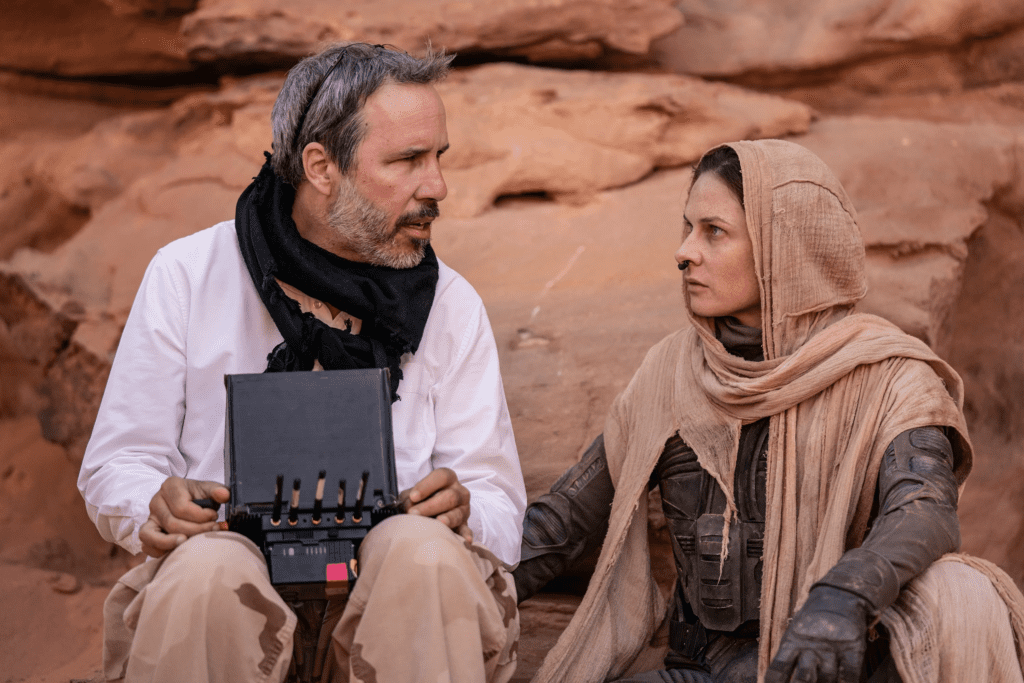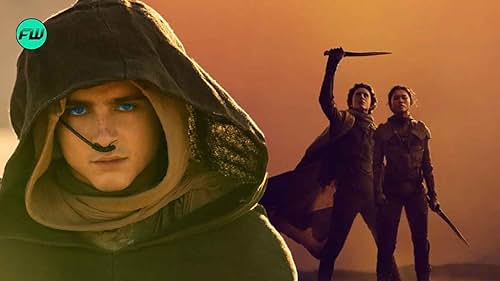The Spectacular New Dune Will Turn Even Skeptics Into Believers
Theocratic authoritarianism, colonial violence, and the pitiless economics of resource extraction—these weighty themes permeate Denis Villeneuve’s Dune movies. Unlike vague allegories merely hinted at between action sequences, these subjects form the very substance of the story. With the release of Dune: Part Two, Villeneuve’s meticulous attention to building out the first movie’s vast and complex world pays off.
In an interplanetary empire governed by multiple competing families, each with centuries-long dynastic histories, the Dune movies belong to the tradition of speculative science fiction. Frank Herbert’s original 1965 novel set the stage for this genre, and Villeneuve’s films continue in that vein. They explore mass belief systems, political power struggles, and intricate human relationships without sacrificing specificity.

Theocratic authoritarianism, colonial violence, the pitiless economics of resource extraction: These subjects are present in Denis Villeneuve’s Dune movies, not as vague allegories gestured at between action sequences to add some thematic heft, but as the very substance of the story. With the release of Dune: Part Two, all the meticulous (some might say exhausting) attention Villeneuve paid to building out the first movie’s vast and complex world—an interplanetary empire governed by multiple competing families, each with centurieslong dynastic histories—pays off.
Also Read: Dune Part 2 Cast Reveal Secrets of the Arrakis Saga.
More than any science-fiction epic I can think of in recent years, the Dune movies, each really constituting one-half of a full story arc, belong to the tradition of speculative science fiction that Frank Herbert’s original 1965 novel partook of and helped to establish: They are movies as much about mass belief systems and political power struggles as they are about characters and relationships, without sacrificing the specificity of the human stories at their center. I was not even a huge fan of Dune: Part One, which struck me as more visually and sonically hypnotic than it was narratively coherent. I was also among the critics who found its truncated ending almost comically abrupt.

But to his great credit, Villeneuve has followed through on the task he set for himself in Dune’s moody, enigmatic, and expansive first chapter: He now returns to the world he so painstakingly established, ready to orchestrate the grand-scale conflicts that are about to tear it apart.
Dune: Part One left me visually and sonically hypnotized but narratively disoriented. Its truncated ending felt almost comically abrupt. However, Villeneuve now returns to the world he painstakingly established. In Part Two, he orchestrates grand-scale conflicts that threaten to tear it apart.
Part Two dispenses with expository supplements like the scenes in Part One in which our young sort-of-hero Paul Atreides (Timothée Chalamet) watches what are essentially 3D documentaries about the geography and culture of Arrakis, the planet where his family is about to be sent to command an occupying army. Instead of reviewing that material, Villeneuve dumps us directly onto Arrakis, the occupied desert planet where, at the end of the last film, Paul and his mother, Jessica (Rebecca Ferguson), found themselves newcomers among the planet’s native inhabitants, the underground-dwelling Fremen.

Now that Paul’s father and most of his home planet’s inhabitants have been massacred by the Harkonnens, denizens of a fascistically organized planet ruled by the repellent Baron Vladimir Harkonnen (Stellan Skarsgård), it falls to the still-inexperienced Paul to help lead the Fremen’s uprising against their colonizers. The substance over which all of these forces are fighting is the coveted mineral resource known as “spice,” a substance found only on Arrakis that has the capacity both to enable interstellar travel and to confer exceptional psychic powers to those exposed to it.
Dune’s plot has no shortage of moving parts, making for plenty of scenes set elsewhere than the parched landscapes of Arrakis. An interplanetary sisterhood of soothsayers called the Bene Gesserit, in which Jessica is a powerful priestess, hovers behind the scenes, influencing the decisions of various characters through advanced practices of mind control, as well as other, more subtle methods of persuasion.
The emperor himself (Christopher Walken), an elderly leader who keeps himself removed from the clashes between worlds he rules over, depends on the political savvy of his daughter, Princess Irulan (Florence Pugh), herself a Bene Gesserit acolyte. And on the eerie planet of Giedi Prime, homeworld of the Harkonnens, gladiatorial games unfold as fascistic mass spectacles that recall Leni Riefenstahl’s Nazi propaganda films, with battles to the death fought out in impossibly vast geometric arenas while all-black firework displays explode like inkblots against a chalk-white sky.

We find ourselves directly on Arrakis, the occupied desert planet where Paul Atreides (played by Timothée Chalamet) and his mother, Jessica (Rebecca Ferguson), are newcomers among the native Fremen. The Harkonnens, denizens of a fascistically organized planet, have massacred most of Paul’s home planet’s inhabitants. Now, the still-inexperienced Paul must lead the Fremen’s uprising against their colonizers.
At the heart of this struggle lies the coveted mineral resource known as “spice.” Found only on Arrakis, spice enables interstellar travel and confers exceptional psychic powers to those exposed to it. Villeneuve’s plot weaves together moving parts, creating scenes beyond the parched landscapes of Arrakis.
Also Read: “Dune: Prophecy” Discover All You Need To Know About.
Dune Will Turn Even Skeptics Into Believers
The original Dune books have long been considered unadaptable, despite how many versions of the story have been told in the past five decades across many mediums. I haven’t read the books, only watched all extant movie adaptations (as well as the delirious 2014 documentary Jodorowsky’s Dune, about the visionary director Alejandro Jodorowsky’s unsuccessful yearslong quest to film the novel), but I think I understand the consensus among their fandom that what’s unique about them translates imperfectly from page to screen; the same could be said of most truly great novels.
Still, Villeneuve’s films, taken together as two halves of a single story, do effectively convey several key elements of the Duniverse: the books’ vast scale, the seriousness of their thinking about authoritarian politics and the danger inherent in religious mass movements, and their author’s rejection of the familiar trope of “the One,” a solitary (nearly always white and male) hero destined by fate to act as the savior for an (often nonwhite) oppressed population.
Dune: Part Two deepens the first movie’s ambivalence toward messianic legend by embedding that ambivalence not only in Paul Atreides’ struggle to reconcile himself with his fate but in the audience’s struggle to know what outcome to root for. As the movie ends, the tone is not triumphant but ominous: After the long-desired prophecy is finally fulfilled, what rough beast slouches toward Arrakis to be born? Even those who, like me, came into the theater more or less Dune-indifferent may find themselves wanting another chapter to find out.










